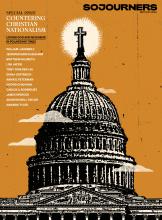COUNTERACTING CHRISTIAN NATIONALISM can feel like political shadowboxing: The thing you are trying to push back against feels elusive, moving like a butterfly but stinging like a bee. It’s somehow both everywhere and staying under cover. With rare exceptions, such as Rep. Marjorie Taylor Greene and Sen. Josh Hawley, few politicians or even Christian leaders self-identify as Christian nationalists. Far-Right Christian leaders such as Tony Perkins have even argued that Christian nationalism is an invention by the Left and academics to marginalize Christian conservatives. But we can’t be fooled. The peril that Christian nationalism poses to our Christian witness and faith and to our democracy is real.
One challenge in confronting Christian nationalism is succinctly defining it. Sociologists Samuel L. Perry and Philip S. Gorski talk about it as “a constellation of beliefs” — such as that the founding of the United States was “divinely inspired” — that are connected to political goals. Another challenge is that Christian nationalism exists on a spectrum, from the quiet but insidious kind that has seeped into many of our churches to the louder, more overt forms we saw on January 6. It has been present in groups throughout our history, from the Ku Klux Klan to the Religious Right to a powerful constituency now helping fuel the MAGA movement. It can be an ideology that asserts that a specific ethno-nationalist brand of Christianity, intertwined with white supremacy, patriarchy, and xenophobia, is the one true faith. And it is a strategy being harnessed to build political power and undermine our democracy. Project 2025, made in collaboration with more than 100 Far-Right organizations, provides a chilling policy and governing blueprint that embraces many tenets of Christian nationalism and would push our nation toward autocracy. We need a variety of approaches to address this continuum.
Read the Full Article

